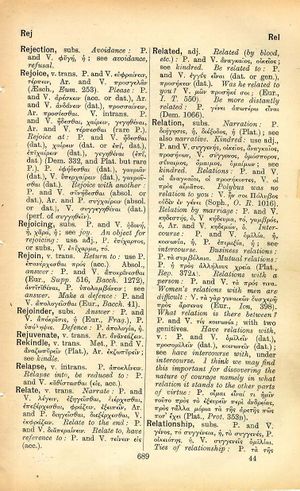rejoin: Difference between revisions
From LSJ
ἀκίνδυνοι δ' ἀρεταὶ οὔτε παρ' ἀνδράσιν οὔτ' ἐν ναυσὶ κοίλαις τίμιαι → but excellence without danger is honored neither among men nor in hollow ships
m (Text replacement - "<b class="b2">Bacch.</b>" to "''Bacch.''") |
m (Woodhouse1 replacement) |
||
| Line 1: | Line 1: | ||
{{Woodhouse1 | {{Woodhouse1 | ||
|Text=[[File:woodhouse_689.jpg|thumb|link={{filepath:woodhouse_689.jpg}}]] | |Text=[[File:woodhouse_689.jpg|thumb|link={{filepath:woodhouse_689.jpg}}]] | ||
===verb transitive=== | |||
Absol., | |||
[[return to]]: use [[prose|P.]] [[ἐπανέρχεσθαι πρός]] (acc.) | |||
Absol., [[answer]]: [[prose|P.]] and [[verse|V.]] [[ἀποκρίνεσθαι]] ([[Euripides|Eur.]], ''[[Supplices]]'' 516, ''[[Bacchae]]'' 1272), [[ἀντιτιθέναι]], [[prose|P.]] [[ὑπολαμβάνειν]]; see [[answer]]. | |||
[[make a defence]]: [[prose|P.]] and [[verse|V.]] [[ἀπολογεῖσθαι]] ([[Euripides|Eur.]], ''[[Bacchae]]'' 41). | |||
}} | }} | ||
Revision as of 08:54, 20 May 2020
English > Greek (Woodhouse)
verb transitive
return to: use P. ἐπανέρχεσθαι πρός (acc.)
Absol., answer: P. and V. ἀποκρίνεσθαι (Eur., Supplices 516, Bacchae 1272), ἀντιτιθέναι, P. ὑπολαμβάνειν; see answer.
make a defence: P. and V. ἀπολογεῖσθαι (Eur., Bacchae 41).

